Hailed as the “father of techno”, David Moufang (Move D) tells us about DJ technology, how 2001: A Space Odyssey was his ultimate inspiration, and shares his favorite tools for producing music. Learn about Move D, his love for partying in the 90’s, how mixing imperfectly is good.
Who Is Move D?
You might know the basics of the history of dance music, but some of the earliest influences aren’t as widely celebrated as they should be. That’s why we’re spotlighting Move D in today’s artist piece.
Moufang’s early influences were space, technology, and, of course, music. After becoming proficient in percussion and guitar, he ventured into the world of early electronic music. In 1989, he was introduced to techno; he spent time in clubs that played ambient techno, and before too long ventured out into production and mixing. Moufang has continued making music into the present day, releasing a number of albums, EPs, and singles, both under the Deep Space Network Moniker as well as his solo name, Move D. – Wikipedia
Watch a classic Mixmag stream of him playing below as you read our interview (he starts his set at 8:45 into the video):
How did the movie “2001: A Space Odyssey” influence your work as a music producer?
Space Odyssey had a huge impact on me. The movie touches topics that are important for today and for the future. It embeds religious aspects, alien story, and artificial intelligence outside of mankind. The movie is also a visual masterpiece and the sound art too. Wendy Carlos was commissioned to compose the soundtrack. Her approach features synthesizers music, but in the end, Kubrick decided to use the music he was using for the raw cut, instead: classical music ranging from Viennese classics like Johann and Richard Strauss as well as some modern/contemporary classical music by the likes of György Ligeti and Jean Sibelius.
As a child, the movie inspired me with strong thematics and the presence of the computer HAL9000 that appears to have a soul or at least feelings, the monolith, the spaceship, and the astronauts and their suits, the elegant aesthetics of costumes, requisites, and technical gear. The more modern, almost atonal music was inspiring me and set me off turning crazy about space-related topics. I watched the movie about 40 times!
What are your early memories of parties and DJing?
The early parties were out of this world. I started DJing in 1987 and I was mainly playing 3 to 5 nights in a kinda mainstream discotheque on High Street – all sorts of more commercial black music from soul to disco and hip-hop. Techno hadn’t really arrived in Heidelberg, yet… my initiation to techno was [via] my friend and DJ/club owner/promoter/producer, DMan. In 1991, I heard DJ Pierre playing a party for DMan in our neighbor city, Mannheim. This was truly a life-changing experience, how he went seamlessly from Chicago House to Detroit Techno then back to Acid House and Disco rooted tracks. In his set, he was playing Underground Resistance and all the cool US stuff and it was such an exquisite mixture.
What was it like to have two grandmothers who are pianists?
I didn’t meet one of my grandmothers as she died before I was born. My grandfather was the one who talked more about music compared to my grandma. When my grandma was playing, I listened to her playing on a cushion underneath the grand piano. Ultimately I preferred my grandfather’s approach the piano – he didn’t read the score but he had the perfect musical hearing, so he was able to replay whatever we had heard before at a concert. He was into beautiful simple stuff like Bach chorales. Grandma was too technical and fast – playing a lot of the romantic era like Chopin, Liszt, and Rachmaninov.
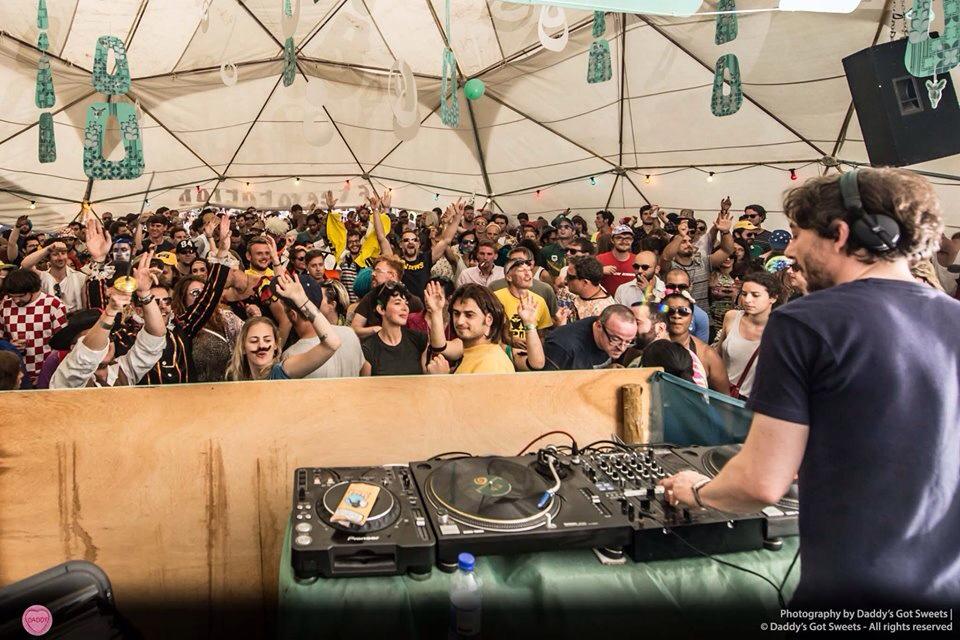
You’ve been DJing for so long – do you still have any fears when you’re playing?
I don’t usually have any stage fright, otherwise, I would not enjoy my job. But sometimes, I do get nervous about the needle skipping or someone giving me strange looks/remarks. Very rarely, the DJ before you is fantastic – then you think: “What am I going to do now?” But most cases, I’m not nervous at all. If you don’t strongly believe that you can do better than anyone else (or at least equally as good in your own special way), you shouldn’t be a DJ…
What are your creative habits when approaching music creation and DJing?
I have no formula or one way. My inspiration often comes from playing a real instrument like guitar or piano. Sometimes, I find something and then go to the studio and produce it. Other times, I play with a synthesizer and then the sound kind of tells it what to do next and the song is creating itself – I’m just engineering it … 😉
I have no fixed routine. Perhaps, as I’m coming from the old school, I can add that it really depends what kind of instruments you use. I like to pick up an instrument that doesn’t require preparation (such as the guitar or the piano) to draft new ideas. With a modular synthesizer, it opens [even more] new ways. In the end, my music is recognizable no matter what approach I was following.
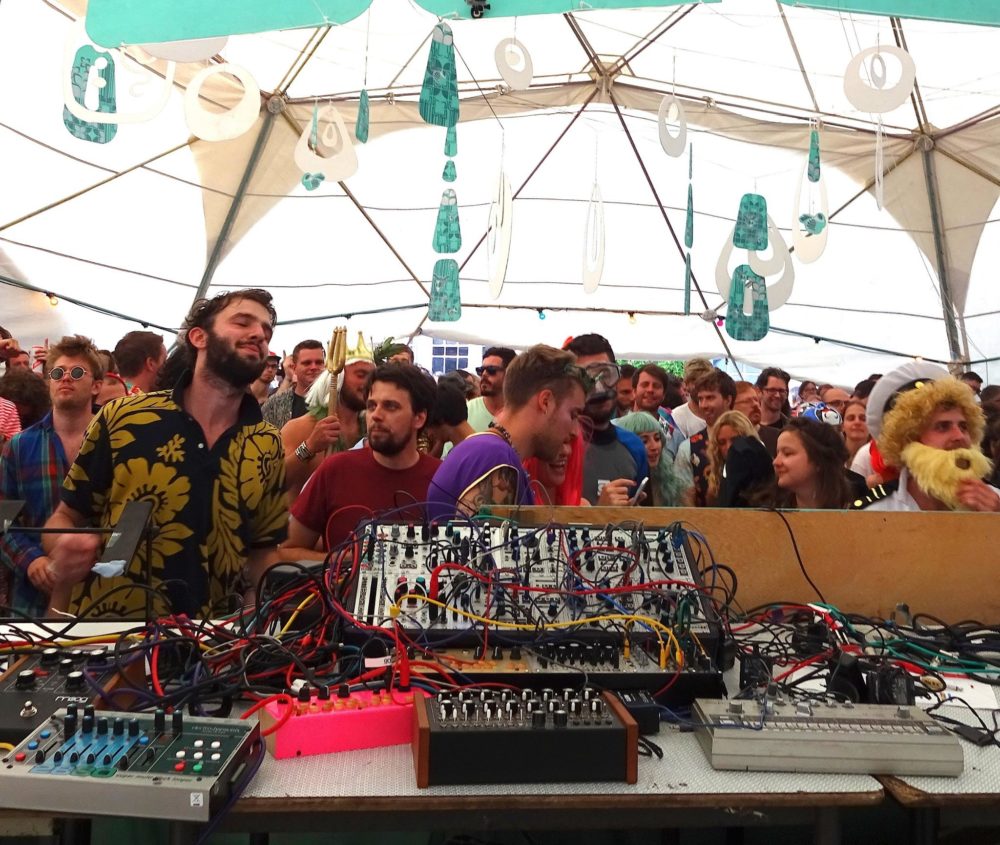
What are your favorite tools for producing music?
The guitar is an instrument that gives me joy and inspiration – a bit like a woman, it’s a very sensual instrument, but I don’t use [it] for music production as much. The piano is the most logical music “machine” – therefore it is an excellent choice for composing without the need for too many technical skills. However, my three most essential tools for the studio on a [desert] island would the Roland TR-606, the Roland SH-101, and the Roland JX-3P.

The JX has a polyphonic step sequencer built-in, which was irreplaceable for me for the longest time but thank god now there is the Arturia Keystep, which allows you to do the same in terms of sequencing, but on top of the sequencer the JX-3P is pretty versatile and potent Synthesizer especially, if you use it with the external PG-200 programmer. With these old-school step sequencers and no memory for sequences, you are forced to always create something new from scratch and there is no risk of falling back to something which you might have previously prepared.
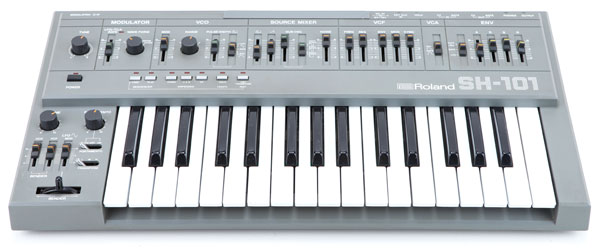
The special thing about the 606 is that it was the first Roland dry machine that was able to go from “pattern play” to “pattern write” and back without the need of ever having to stop. You can even change time signatures and step resolution in real-time. Of course, today a lot of machines give you this kind of functionality, but it seems much harder to navigate through the number of features.
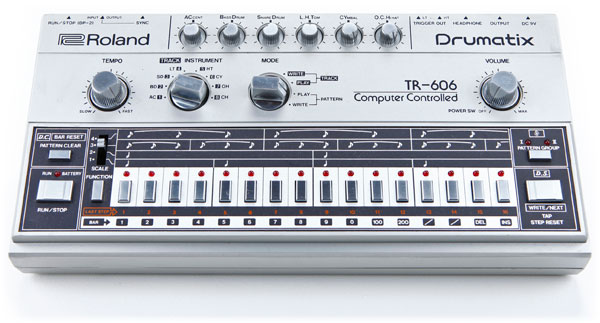
With these three hooked up (the 606 triggers advance the built-in sequencers of 101 and JX), I can always come up with a basic track of drums, bass/synth/fx, and chords in no time. Definitely, the most direct way for me to create electronic music.
I also love the German Tinysizer which is a tiny analog modular synth with built-in reverb and delay – handmade by a guy near the city of Cologne in Germany. It is based on the Oberheim SEM concept and it has an incredible range of smooth but also experimental sound – it never sounds ugly, though. The patch connectors and the cables are very thin and a bit hard to see (especially if you are 50+) but you have access to incredible 350 patch points.
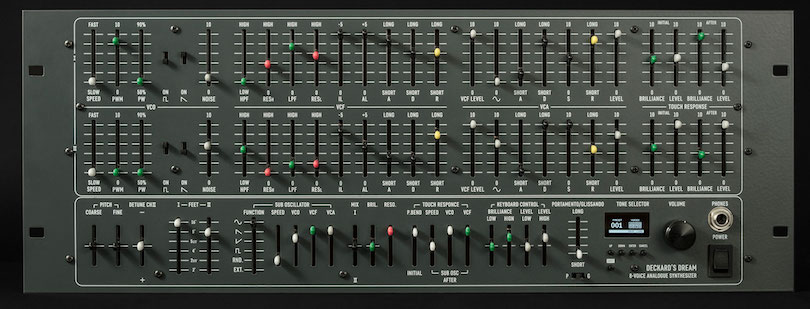
My latest favorite is made by a Russian friend of mine Roman Filippv who now runs Black Corporation in Japan and he is building an 8 voice rack synthesizer called Deckard’s Dream. [It’s] based on the rare and unaffordable Yamaha CS-80, which was heavily used by Vangelis for the soundtrack of the original Blade Runner Movie. Roman made a name for cloning Buchla modules back in Moscow, then he launched his own modular synth brand “Sputnik Modular” in Portland, where he started showing his own genius ideas for the first time before moving on to Tokyo and launching Black Corporation. Deckard’s Dream really is a dream synth – his goal to reinterpret the CS-80 was very ambitious and I have to admit that I was a bit skeptical, but I am a total fan now. I am eagerly waiting for the next synths Roman will come up with.
How about your favorite DJ tools?
As for the DJ gear, it’s the same as with synthesizers. I like old stuff, no gimmicks, no colorful lights like in a candy or toy store. I don’t have much respect for the common trend of automating the job of a DJ by auto sync. Honestly, to me, it feels like the end of an era. Seeing “DJs” perform even without headphones feels like an assault to me.
These days I sometimes have to use a USB myself (mostly due too poorly maintained turntables or a bad setup on a vibrating table) but in my mind, you are a DJ if you play records.
How do you select records for harmonic mixing?
When playing records and matching the BPM, the pitch of the two records usually will be all over the place – not only different scales but a whole different tuning. But sometimes, there is a lucky accident where two records at the same BPM will actually really gel. When [this happns], I try to remember those tunes that go together well. Mixing music (not only beats) remains tricky – that’s why it is so much harder to mix “music“ as opposed to (minimal) techno, where the key and the scales aren’t necessarily obvious.
I sometimes like imperfection, it makes a recording truly unique and characteristic.
Sometimes, when playing disco, there can be a clash of harmony. It’s part of the experience. Another example is in early hip-hop, where you could only match the speed. There was no time stretching yet, which allows you to treat the tempo and the pitch independently. So, when the guys back in the day were beat matching their loops and elements, they weren’t all in perfect tune. Sometimes this was slightly irritating or annoying, but in some cases it added a certain tension or friction to the tracks which doesn’t exist anymore – instead we are getting a lot off artifacts caused by time stretching. [Autotune/pitch correction is happening] to the background music, and it makes everything sound too clean, sterile, and artificial. I sometimes like imperfection, it makes a recording truly unique and characteristic.
So imperfection in DJing is beautiful?
To me, when everything is perfect, it’s redundant and becomes boring. I have a feeling the perfect quantization of pitch and tempo is boring people, because their brain will constantly analyze what it is hearing, but if a pattern is repeating perfectly, the information becomes redundant and pushed out of focus. I think this is the reason why people these days appreciate disco so much. It is alive, it can go wrong, it never exactly repeats, there is variation in every single bar! Look at the energy it transmits – people are popping! This has to do with imperfection aka variation and alteration.
It isn’t even a bad thing to feel with the DJ as he is struggling with his mix - Miles was struggling with the notes coming from his horn
The brain is good at calculating beats. If the tempo fluctuates, it’s more evolving. That’s why I think the perfect “beat sync” DJ set is boring, as well – if you listen to great DJs like Jeff Mills, Larry Levan, and DJ Harvey, you will notice that a lot of their mixing is “perfect”, but the drifting and the friction and their real-time interaction makes these sets so much more adventurous and surprising.
It isn’t even a bad thing to feel with the DJ as he is struggling with his mix – Miles was struggling with the notes coming from his horn, Chet Baker [struggled] with his voice – this is actually what defines their unique sound. A perfect DJ mix often makes me wonder if the guy is playing the same track for the entire set. Slight imperfection provides another energy. It’s part of creating a unique moment. The way DJs are heading now is being controlled by the machine – they next will be replaced by a DJ robot. With the help of Ableton and co you can now even map disco songs and force them on a perfect grid, so they can be beat matched, but in my point of view this is making them lose their soul – they start to sound like (techno) edits and they lose their human groove. Personally, I am way more impressed with DJs who rather play across the board in terms of BPM but still maintaining the energy.
How does current techno compare to what you’ve experienced in the early days?
Techno was more daring in the early 90s. Because the genres were not as defined as they are nowadays. You could see some DJs playing trance, heavy hardcore, and then would switch the BPM from 160 to 120. A variation of over 50 in the BPM was totally acceptable.
Techno was more daring in the early 90s
Also, since we had less choice and less music available compared to today, people were more accepting different styles of techno, as long as they were well executed. Techno was still new and the DJs back in the day like for instance Ellen Alien were a lot more experimental than the current generation, Very sad, considering that now there is more music being out there (on the internet) than ever. Sometimes, I think there are more people producing techno than there are people who are actually listening to (electronic) music, which includes me…
What’s different in today’s parties compared to the scene you were a part of in the 90s?
I still idealize the 90’s because I was young myself – the experience you make growing up to your twenties will always be significant to each and every one of us. But I would argue that ravers in the early nineties were much more willing to explore. Today, I still think that people in their early 20s are the most interesting (especially in the UK). They look at techno with a different perspective, they are a whole new generation and for the first time I find people who know and care more about Gary’s Gang then Sven Väth. They have a different upbringing and social background, their view of a dance party is not restricted to formulas laid out some 30 years ago.
When I went to my first techno parties, it was less commercial and more open. If people had no money, they would work in the cloakroom or help with the decoration instead of paying to get in. When techno came to Berlin and Frankfurt, it was also was a much bigger “mainstream” phenomena – today it really is a niche thing. But the soon money came with vodka, cigarettes, and car companies sponsoring events. In the early 90s, at least 40% to 50% of young people were into techno. Clubs in Berlin were always full. Good times but I wouldn’t want to go back in time – I am grateful for the variety and freedom there is today when you look at UK festivals like Freerotation and Gottwood. I never see any aggression. Honestly, British ravers are the best – as long as they are not invading the south of Europe in summer. 😉
Germany and Europe may have seen their ups and downs but it is nice to witness how techno still is on the rise in eastern Europe, Asia, and the Americas.





